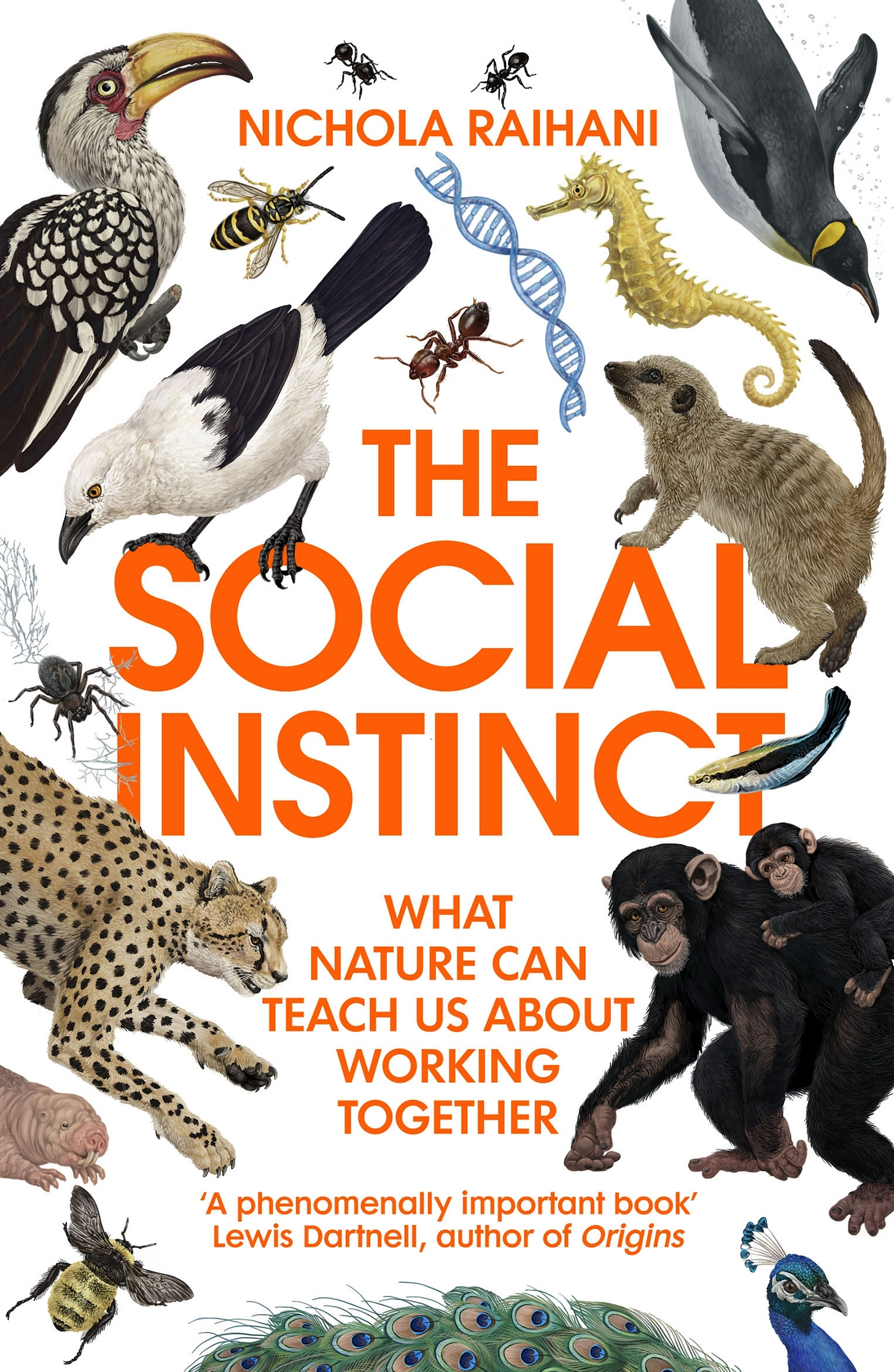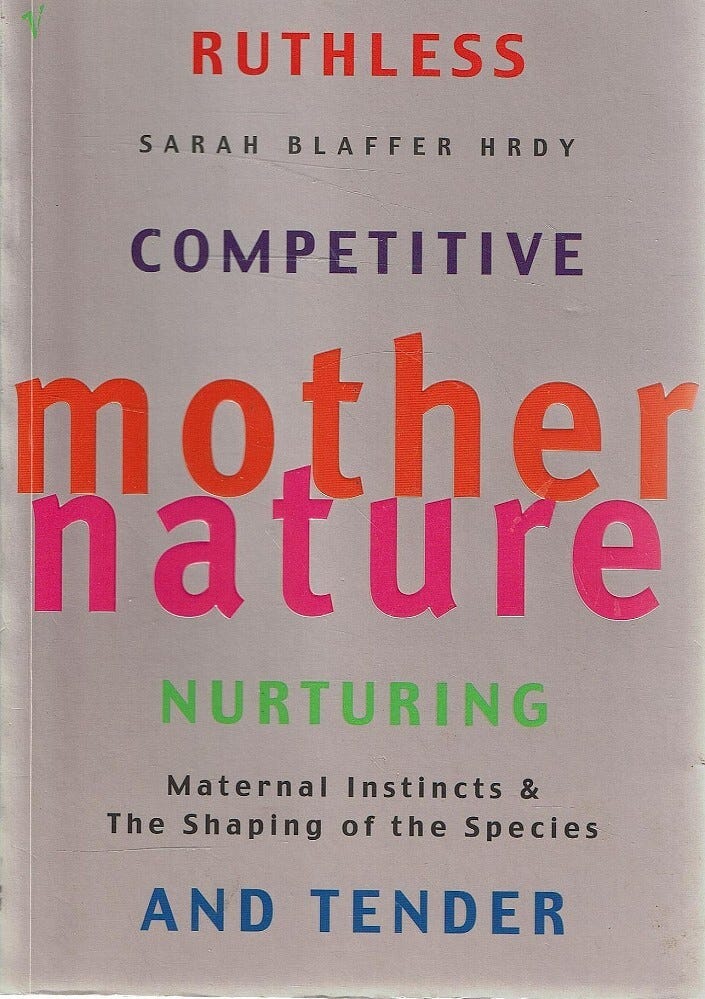No, evolutionary theory does not justify your worst political nightmares
It is just about understanding reality
In Bertolt Brecht's play The Life of Galileo, the scientist attempts to convince religious representatives that not everything revolves around the Earth by showing them that moons orbit Jupiter—something observable through a telescope. As Galileo urges one interlocutor to look through the telescope and see with his own eyes, the other refuses, fearing the implications of such observations.
The Philosopher: I am just asking myself where all this may lead.
Galileo: I would suggest that as scientists it is not for us to ask where the truth may lead us.
The Philosopher: furiously. Signor Galilei, the truth may lead us to absolutely anything. - Brecht (1938)
I have previously discussed the criticisms of evolutionary explanations. One might wonder why these explanations, particularly in evolutionary psychology, face such significant criticism. I suspect this is not primarily due to their epistemological weaknesses. While evolutionary sciences face challenges, such as the difficulty of experimentation compared to other scientific areas, I believe the methodological critiques are amplified by political concerns about their potential implications. This post addresses those concerns. If you are interested in evolutionary explanations, rest assured they do not necessitate an allegiance to any “evil” political ideology.1
The dangers of “social Darwinism”
Evolutionary ideas are often introduced with a warning about their misuse by “social Darwinists,” who appropriated Darwin’s ideas to justify capitalism’s inequalities, racism, imperialism, and even eugenics. That’s quite the political baggage—enough to make any reasonable person shiver at the thought of engaging in discussions about how to apply evolutionary ideas to the fields of sociology and psychology.
The reality of social Darwinism
Discussions of social Darwinism often present a collection of unpalatable ideas—like the justification of racial and social inequalities—allegedly held by a group of thinkers, without providing specific references.2 This creates the impression of a cohesive ideology founded on Darwinian ideas that existed in the 19th century.
However, Social Darwinism, as an ideology, is largely a chimera—a composite of unrelated thinkers grouped together after the fact.
Social Darwinism is singular in that virtually no one adopted it as a badge of honor. A social Darwinist, to oversimplify the case, was something nobody wanted to be. - Bannister (2010)
The term was initially coined as a libel. Economist Geoffrey Hodgson traced its first usage to a political tract by French anarchist Émile Gautier in 1880. Gautier used it to criticise those who claimed to justify capitalist competition and laissez-faire policies with Darwinian ideas (Hodgson, 2024). Initially, the term was primarily used in French and Italian political contexts.
The term gained prominence only in the 1940s. Sociologist Talcott Parsons employed it in his 1932 and 1937 articles to oppose the application of Darwinian ideas to social sciences. His critique stemmed from scientific disagreements, not political accusations. Post-World War II, the term’s political and scientific meanings merged, significantly shaped by Richard Hofstadter. A former communist and anti-capitalist historian, Hofstadter primarily relied on secondary sources and portrayed social Darwinism as synonymous with selfish individualism and competition (Hodgson, 2024).

Diverse authors have progressively been lumped under this term. Those accused of social Darwinism had varied and sometimes contradictory views. Herbert Spencer, the most frequently associated with this term, was not described as a social Darwinist before 1933. Politically, he can be considered somewhat libertarian, advocating for minimal government intervention. He did not promote eugenics, and he was opposed to nationalism, imperialism and war (Hodgson 2024).3 In his extensive writings, Spencer primarily explored the implications of evolutionary ideas for understanding society, anticipating some aspects of modern cultural evolution theories.
It is true that many thinkers who were given the Social Darwinist label justified social inequalities and European superiority. However, such views were not uncommon among the British upper class in the 19th century and predated Darwin’s Origin of Species. These thinkers often blended pre-existing beliefs with discussions of Darwin’s theory.4 Importantly, Darwin’s ideas influenced thinkers across the political spectrum. Karl Marx, for instance, famously praised On the Origin of Species:
This is the book which contains the basis in natural history for our view. - Marx (1860)
Evolution does not carry moral principles per se
At any rate, Darwin’s ideas do not have the type of moral implications that “social Darwinists” made, or are suggested to have made, like the justification of inequality and the domination of some human groups over others. Evolution is an impersonal process, it does not imply any moral principle per se.
Consider the example of the creature below. It is the product of evolutionary selection for its ability to walk, simulated by computer algorithms. The process began with creatures unable to walk, and through selection, the population progressively became better at walking. Suppose this creature were capable of conscious thought—what conclusions could it reasonably draw from its existence? The image presents one correct statement and three that do not follow logically. The creature has no “obligation” to procreate, eliminate weaker creatures, or sacrifice itself for the population. Where would such obligations come from?5

A praise of selfishness?
Even without moral imperatives, evolutionary ideas are often criticised for painting a bleak picture of life as being driven by unabated selfishness and a “fight of all against all.” This worldview is rejected as tasteless and dispiriting.
At a fundamental level, evolution is indeed a competitive process. Everything that emerges through evolution arises from competition. This led some early thinkers influenced by Darwin’s ideas to frame social issues around the “struggle for existence” as a central principle of life.
However, modern evolutionary theory highlights the critical role of cooperation. In her book The Social Instinct, Nichola Raihani discusses for instance how cooperation and the win-win situations it creates operate at all levels of life, from genes to social groups.
Indeed, it is because of the importance of cooperation in humans that our psychology is tailored to care about others, their feelings and, their intentions. Our social emotions help us successfully navigate complex social interactions, being kind with those who are kind to us without being pushovers with those who are not. Ironically, it is these social feelings shaped by evolution that make us find the underlying competitive aspects of evolution dispiriting (Page 2022).
Evolutionary ideas and sexism
Evolutionary ideas have often been accused of justifying social inequalities between men and women. This is understandable, as alleged natural differences have historically been used to legitimise institutions giving a lower social status to women. Feminist thinker Sue Rosser explicitly articulated this concern:
Emphasizing separation or differences between males and females often leads to a form of biological determinism implying that differences in social and cultural role, status, and behavior are caused by genetic, hormonal, or anatomical differences between the sexes. - Rosser (1992)
One political strategy to counter the ideological justification of inequalities between sexes is to reject differences as socially constructed and therefore changeable, rather than natural and immutable. The second wave of feminism in the 1960s and 1970s, influenced in part by Simone de Beauvoir’s The Second Sex (1949),6 took this route. Feminist scholars distinguished between sex (biological) and gender (social), arguing that eliminating socially constructed psychological differences would allow for equal roles. In the 1990s, the third wave of feminism went further, treating sex itself as a social construct (Vandermassen, 2005).
This focus on social explanations of differences—particularly psychological ones—led many feminists to view evolutionary explanations of sexual differences as politically motivated attempts to reinforce existing inequalities. Rosser even questioned whether such research should be conducted:
One can imagine that a society free from inequality between the sexes would not view sex differences research as a valid scientific endeavor. - Rosser (1992)
The idea that evolutionary theory conflicts with women’s rights to equal status in society is however misguided. Several evolutionary psychologists, including feminist scholars like Griet Vandermassen7 and Sarah Hrdy have strongly argued that evolutionary perspectives can coexist with feminism.
Hrdy’s books on motherhood are among the most insightful one can find to understand the challenges faced by women and the strategies they adopt to face them. The image of women’s psychology that emerged from her work is far from the view of passive and submissive beings promoted in the past.
Hrdy regretted that many feminists rejected biological realities for political reasons.8 Feminist philosopher Noretta Koertge also questioned the long-term effectiveness of such a strategy:
History should have taught us by now the futility of such a strategy—the act of banning Copernicanism hurt the Catholic Church much more than heliocentrism could ever have done. Lysenkoism did nothing to help peasants improve their agricultural practices while it delayed the adoption of hybrids developed in the West. Women will not benefit in the long run from attempts to block the study of biological differences. - Koertge (1996)
While evolutionary ideas have sometimes been used to legitimate inequalities between men and women, it is not the case in modern evolutionary science. In any case, with 75% of psychology doctoral students now being women, the future of evolutionary psychology will largely be shaped by women.
Are evolutionary ideas rightwing?
With the previous accusations—social Darwinism, praising selfishness, sexism—evolutionary ideas are sometimes accused of being incompatible with progressive views.
One simple fact seems however incongruent with this accusation: most evolutionary scientists, like the majority of academics, are left-wing (Tybur et al. 2007, Lyle and Smith 2012). If evolutionary theory is conservative, it does a pretty bad job at shaping the political views of its academic proponents.

What are the political implications of evolutionary theory?
As I indicated above, the process of evolution does not have direct implications about morality and values. However, understanding how evolution shaped our psychology has nonetheless implications for what should be done in society. The feasibility, stability, and sustainability of political systems depend on what is possible, what works, and how well. Some systems are inherently more viable than others as a matter of fact.
Consider communism, an ideology purporting to base society on strong principles of cooperation and equality. E.O. Wilson famously remarked “Wonderful theory, wrong species”. Wilson, a specialist on ants, noted in his work that within ant colonies, individuals share 75% of their genetic material. For humans, it would be the equivalent of being halfway between siblings and identical twins. This close genetic relatedness aligns the interests of individual ants with the fate of the colony and the queen, who produces all offspring. The type of species Wilson thought communism might work for were certainly ants.

In contrast, humans in any given community are far less genetically related. While cooperation brings substantial benefits, individual motives are typically imperfectly aligned. Historical attempts to enforce collectivist lifestyles on humans have resulted in inefficiencies and exploitation, with workers withholding effort and leaders hoarding resources for themselves and their families. Even small-scale communities based on collectivist principles have typically collapsed due to internal tensions
In the nineteenth century and early decades of the twentieth, self-contained communes based on a philosophy of communal sharing sprang up throughout the United States. All of them collapsed from internal tensions, the ones guided by socialist ideology after a median of two years, the ones guided by religious ideology after a median of twenty years. The Israeli kibbutzim, originally galvanized by socialism and Zionism, steadily dismantled their collectivist philosophy over the decades. It was undermined by their members’ desire to live with their families, to own their own clothing, and to keep small luxuries or sums of money acquired outside the kibbutz. And the kibbutzim were dragged down by inefficiencies because of the free-rider problem. - Pinker (2002)
Proposed political solutions that assume everyone will simply “do the right thing” are a red herring. A central challenge in political theory is that people typically do not all just want to do what might be in the best from a collective point of view.
Evolutionary theory has therefore some political implications. Specifically, it suggests that sustainable social systems need to accommodate the imperfectly aligned motives of individuals.
Philosopher Peter Singer, a prominent advocate of effective altruism and animal rights, argued in A Darwinian Left (2000) for a left-wing stance that avoids factually incorrect assumptions about human nature.
Stand by the traditional values of the left by being on the side of the weak, poor and oppressed, but think very carefully about what social and economic changes will really work to benefit them. - Singer (2000)
For Singer and many other evolutionary thinkers, the facts of evolution are not incompatible with progressive policies. Instead, these facts can help avoid the pitfalls of ideologies that seem ideal on paper but fail in practice.
Facts are stubborn things
Whether the topic is the existence of God, the reality of free will, or the nature of human behaviour, we often hold preferences about what we would want reality to be. When confronted with evidence that contradicts those preferences, we may be tempted to think: “It can’t be possible. It would be too horrible if it were true." This thought might tilt our mind into rejecting the evidence we face. Clearly, this is not a good way to form beliefs about reality. As U.S. President John Adams famously stated:
Facts are stubborn things; and whatever may be our wishes, our inclinations, or the dictates of our passions, they cannot alter the state of facts and evidence. - Adams9
Beyond the critiques of evolutionary explanations there is often a rejection of what they imply—or rather what they are perceived to imply—about reality. This motivated skepticism10 explains much of the resistance to evolutionary explanations: Desired conclusions are readily accepted, while a much higher standard of evidence is required for conclusions deemed undesirable. Anne Fausto-Sterling acknowledges this attitude plainly in her book Myths of Gender:
I impose the highest standards of proof, for example, on claims about biological inequality, my high standards stemming directly from my philosophical and political beliefs in equality. - Fausto-Sterling (2008)
Sometimes, the choice of beliefs based on preferences is even explicitly acknowledged. For instance, Helen Longino, in Science as Social Knowledge stated the prevalence of political considerations over reasoning.
Our political commitments, however, presuppose a certain understanding of human action, so that when faced with a conflict between these commitments and a particular model of brain-behavior relationships we allow the political commitments to guide the choice. […] I am suggesting that a feminist scientific practice admits political considerations as relevant constraints on reasoning. - Longino (1990)
Prioritising preferences over facts cannot be helpful in the long term. Whether we like a particular explanation about reality has no bearing on its accuracy. Facts remain stubborn; rejecting them because we don’t like them doesn’t change the world—it only delays our ability to engage with it adequately.
Evolutionary explanations are often accused of having dire political implications. These accusations motivate the rejection of evolutionary explanations. This attitude is misguided. Evolutionary theories do not logically justify the political nightmares they have been accused of supporting. Indeed, evolutionary thinkers have been found on all sides of politics.
At any rate, political preferences are irrelevant to assessing the validity of evolutionary explanations. There is no point in refusing to look into a scientific lens because, like Brecht’s Philosopher, what we would see might not please us. Intellectuals whose conceptual framework about humans and societies is devoid of an awareness of evolutionary explanations are bound to live in an Alice in Wonderland world where explanations are disconnected from grounded evidence.11
Evolutionary theories, like other behavioural sciences such as economics and sociology, offer valuable insights into why people behave the way they do and how societies function. This knowledge is essential for anyone seeking to improve how societies work.
This is the third and last post in a series on the value of taking an evolutionary perspective when trying to understand human behaviour. The next series of posts will be on coalitional game theory and psychology.
References
Bannister, R., 2010 (first published 1979). Social Darwinism: Science and Myth in Anglo-American Social Thought. Temple University Press.
Brecht, B., 1938. The Life of Galileo.
De Beauvoir, S., 2011 (originally published 1949). The Second Sex, translated by C. Borde & S. Malovany-Chevallier. Vintage Books, London.
Fausto-Sterling, A., 2008. Myths of Gender: Biological Theories About Women and Men. Basic Books.
Gould, S.J., 1996. The Mismeasure of Man. Revised and expanded edition. W.W. Norton & Company, New York.
Hagenbach, J., and Saucet, C., 2024. Motivated Skepticism. Review of Economic Studies, p.rdae058.
Hodgson, G.M., 2024. Social Darwinism Revisited: How Four Critics Altered the Meaning of a Near-Obsolete Term, Greatly Increased Its Usage, and Thereby Changed Social Science. Journal of Evolutionary Economics, pp.1-25.
Hrdy, S.B., 1999. Mother nature. London: Chatto & Windus.
Huxley, T.H., 1893. Evolution and Ethics. Delivered in the Sheldonian Theatre, May 18, 1893. Reprinted in 1894. London: Macmillan and Co.
Koertge, N. 1996a, ‘Wrestling with the social constructor’, in P.R. Gross, N. Levitt & M.W. Lewis (eds), The Flight from Science and Reason, New York Academy of Sciences, New York.
Lyle, H.F., and Smith, E.A., 2012. How Conservative Are Evolutionary Anthropologists? A Survey of Political Attitudes. Human Nature, 23, pp.306-322.
Marx, K., 1860. Letter to Friedrich Engels, 19 December. In: Marx, K., & Engels, F., 1975. Selected Correspondence 1846–1895. New York: International Publishers, p. 126. Also in Marx and Engels Collected Works, vol. 41, p. 232.
Page, L., 2022. Optimally Irrational: The Good Reasons We Behave the Way We Do. Cambridge University Press.
Pinker, S., 2002. The Blank Slate: The Modern Denial of Human Nature. New York: Viking.
Raihani, N., 2021. The Social Instinct: How Cooperation Shaped the World. Random House.
Rosser, S.V., 1992. Biology and Feminism: A Dynamic Interaction. New York: Twayne Publishers.
Singer, P., 2000. A Darwinian Left: Politics, Evolution and Cooperation. Yale University Press.
Tybur, J.M., Miller, G.F., and Gangestad, S.W., 2007. Testing the Controversy: An Empirical Examination of Adaptationists’ Attitudes Toward Politics and Science. Human Nature, 18, pp.313-328.
Vandermassen, G., 2005. Who's Afraid of Charles Darwin?: Debating Feminism and Evolutionary Theory. Rowman & Littlefield Publishers.
Note that I am not an “evolutionary psychologist”. I am an economist and I have worked on explaining features of human cognition using evolutionary principles in a way that leverage the formal tools of economic theory.
This criticism was raised by Hodgson (2024). For instance, biologist Gould defines “social Darwinism”, without providing any references:
The initial meaning referred to a specific theory of class stratification within industrial societies, particularly to the idea that a permanently poor underclass consisting of genetically inferior people had precipitated down into their inevitable fate. - Gould (1996)
The concept of eugenics was introduced by statistician Francis Galton, a cousin of Darwin, who partially justified his ideas using Darwin’s theory. Galton is not typically categorised as a social Darwinist. His proposals focused on encouraging the reproduction of individuals with “desirable traits” and discouraging reproduction among those with “undesirable traits”. Forced sterilisation, the darkest side of eugenics, was promoted later by thinkers like Madison Grant, who advocated for sterilisation policies in the United States.
Spencer’s emphasis on competition and the struggle for existence was often perceived as a justification for the social hierarchies of his time. This interpretation drew criticism from several authors then, including Thomas Huxley (1893), often referred to as “Darwin’s Bulldog”.
You might think that the creature has—for some reason—an obligation to fulfil the goals set out by its programmers. However, such reasoning does not extend to humans shaped by natural evolution. Evolution is an impersonal process—it is not a being or entity, and there is nobody to owe anything
Simoe de Beauvoir emphasised the role of socialisation in shaping women’s roles and psychology. She famously stated:
One is not born, but rather becomes, a woman. - De Beauvoir (1949)
Vandermassen’s 2005 book on the history of feminism and evolutionary thinking is an excellent resource on this topic. Several quotes in this post are drawn from her work.
[…] feminists, social historians, and philosophers were already convinced that they knew what evolutionists had to offer, that it was necessarily flawed, determinist, and uninsightful. Natural selection, and with it the most powerful and comprehensive theory available for understanding the basic natures of mothers and infants, was rejected, as social scientists and feminists took another route. That path, which led away from science, led them to reject biology altogether and construct alternative origin stories, their own versions of wishful thinking about socially constructed men and women […] - Hrdy (1999)
This quote is a retelling of a previously existing idiom.
See Hagenbach and Saucet (2024) for evidence of motivated skepticism.
Of course, not all evolutionary papers are good. Some are flawed, just as in any other scientific discipline.









Love the article. My feeling is that a lot of people find talk of 'evolution', when it comes to any policy discussions or debate around the structure of society, a little 'weird' or uncomfortable.
I wonder if there's any practical steps people interested in this stuff can take not to put people off? Is there something in the manner in which science is talked about maybe?
TL:DR humans use science to support what they want to support, and reject science when they don't like the conclusions it may lead to.